Emigration from Liverpool - 1850
We now detail the emigration process, beginning with the arrival of the emigrants at Liverpool, the great port of intercourse with the United States.
In the annexed illustrations, our Artists have portrayed the principal incidents that occur in port—from the arrival of family to their final departure from the Mersey.
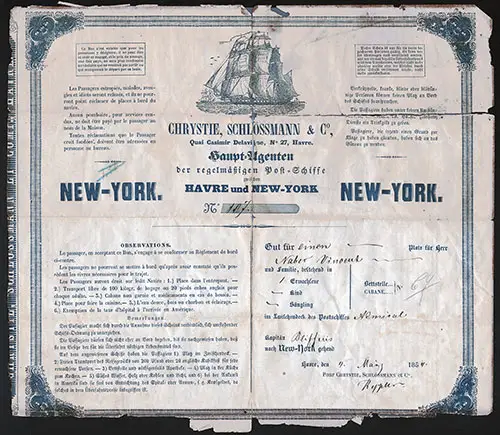
Front of Steerage Passage Contract from 1854, Le Havre to New York GGA Image ID # 102808387e
The emigrants' first order of business is their Passage Contracts. Whether their passage has been prepaid for them by kind friends in New York or not, the payment for their journey is now due. This is a crucial step, and emigrants can actively participate by making their best deal with the passenger brokers.
The competition in this trade is exceedingly high, and fares are based accordingly. They often vary from day to day and even from hour to hour, giving you the power to choose the best deal. Sometimes as high as £5 per passenger in the steerage and sometimes as low as £3 10s, the flexibility is in your hands.
All persons contracting to convey passengers to North America must take out a license; under the new act, they must also give bonds by themselves and two sureties to the Colonial Land and Emigration Commissioners, to the amount of £200.
There are, at present, twenty-one licensed passenger brokers in Liverpool, providing you with a variety of options. The following list appears in the Liverpool Journal.
- George Percival, representing the house of Messrs. Harden and Co.;
- John Wilson, representing Messrs. Pilkington and Wilson, 55, Waterloo-road;
- Daniel P. Mitchell, representing Messrs. Train and Co.;
- Josiah Thompson, representing Messrs. Grimshaw and Co., 11, Goree-piazzas;
- J. T. Crook, 2, Tower-chambers, Old Churchyard, and 115, Waterloo-road;
- George Saul, 36, Waterloo-road;
- J. W. Shaw, 90, Waterloo-road;
- Robert Dunn, 1, Cook-street;
- Orson Pratt, 15, Wilton-street;
- Thomas Elliott, 11, Waterloo-road;
- W. Robinson, 48, Waterloo-road;
- William Tapscott, Regent-road;
- Frederick Sabell, 28, Moorfields;
- Eleazar Jones, 25, Union-street;
- G. C. Beckett; 116, Waterloo-road;
- J. S. Holmes, 120, Waterloo-road;
- D. O'Donovan, 117, Waterloo-road;
- Edward Matthew Norris, 6, Regent-road;
- William Russel Grace, 120, Waterloo-road;
- Thomas Lockhart, 192, Great Howard-street;
- William Maume, 6, Regent-road; and
- Michael McDonnell, 47, Union-street.
Amongst this twenty-one (22?), says the Liverpool Journal, are the names of parties well known in Liverpool, of high honor and strict integrity. On the other hand, it must be confessed that there are some to whom this character will not apply.
Lt. Hodder, the Government Emigration Agent, and his officers were constantly combative in protecting poor emigrants and ensuring regulations were followed.
[unintelligible sentence reproduced below without edits]
If a summons be taken out, the chances are ten to one but that the poor people whom it was intended to victimize are treated with; and, to save the exposure which would otherwise result, the case is compromised at any price.
The average number of steerage passengers accommodated in these fine vessels (mostly owned in New York) is 400. Still, some, such as Isaac Webb, can comfortably make room for double that number.
After choosing the ship to sail on, the emigrant runs the gauntlet through scores of designing and unscrupulous "man-catchers." Man-catchers get commissions for each emigrant they bring to the passenger-broker's office. The emigrant's next duty is to present himself with his family at the Medical Inspector's Office.
The magistrates may withdraw a license for any irregularity or delinquency—a power sometimes exercised. Still, no instances of bond forfeiture are on record.
The walls of Liverpool are placarded thoroughly with notices of the sailing dates for the various packet ships. The above firms act as passenger brokers and outlined in large letters the excellent qualities of such well-known and favorite packets as the Yorkshire, the New World, the Isaac Webb, the West Point, the Constitution, the Isaac Wright, the London, the Star of the West, the Queen of the West, and scores of others.
Medical Inspector's Office
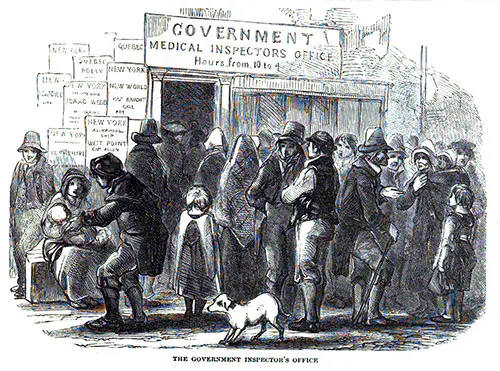
The Government Medical Inspector's Office at Liverpool. The Illustrated London News, 6 July 1850. | GGA Image ID # 21edadda36
By the terms of the New Passenger Act, 12 & 13 Vict, c. 33, "no passenger ship is allowed to proceed until a medical practitioner appointed by the emigration office of the port shall have inspected the medicine chest and passengers and certified that the medicines, etc. are sufficient and that the passengers are free from contagious disease."
The master, owner, or charterer of the ship is bound to pay the medical inspector £1 sterling for every 100 persons thus inspected. When the emigrant and his family have completed this process, their passage ticket is stamped.
They have nothing further to do until they go on board. They now make their private arrangements and provide themselves with outfits or articles of luxury or necessity as they may desire over and above the ship's allowance.
All persons who may be discovered to be affected with any infectious disease, either at the original port of embarkation or at any port in the United Kingdom into which the vessel may subsequently put, are to be re-landed with those members of their families, if any, who may be dependent on them, or unwilling to be separated from them, together with their clothes and effects.
Passengers who re-landed are entitled to receive their passage money. This may be recovered from the party to whom it was paid or from the owner, charterer, or master of the ship by the summary process before two or more justices of the peace.
The Embarkation
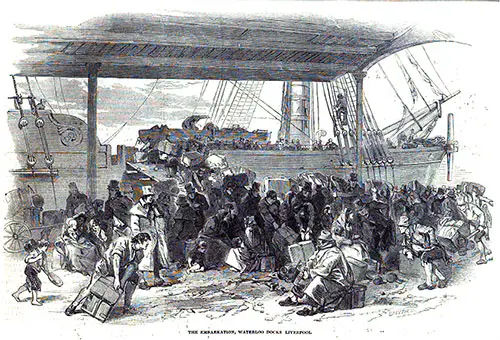
The Emigrants Begin the Process of Embarkation at the Waterlook Docks in Liverpool. The Illustrated London News, 6 July 1850. | GGA Image ID # 14b686ca8a
The scene at Liverpool's Waterloo Dock, where all the American sailing packets are stationed, is always bustling. But, on the morning of the departure of a large ship with a full complement of emigrants, it is peculiarly interesting and exciting.
Many passengers who passed inspection take up quarters onboard the ship twenty-four hours before sailing, as they are entitled to do by the terms of the act of Parliament. In addition to the boxes and trunks containing their worldly wealth, many of them bring considerable quantities of provisions.
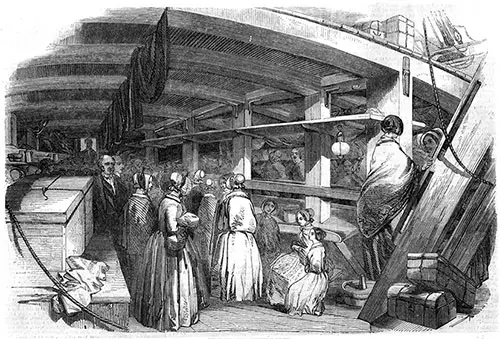
Life in Steerage Between Decks on an Emigrant Ship. The Illustrated London News, 17 August 1850. | GGA Image ID # 14b721f545
However, it must be confessed that the provisions fixed by the Government to be supplied to the emigrants by the ship are sufficiently liberal to keep them healthy and comfortable all among the emigrants, who, in their ordinary course of life, were not accustomed to animal food.
The following is the scale, in addition to any provisions which the passengers may themselves bring: —
- 3 quarts of water daily
- 2 ½ lbs. of bread or biscuit (not inferior to navy biscuit)
- 1 lb. wheaten flour
- 5 lb. oatmeal
- 2 lb. rice
- 2 oz. tea
- ½ lb. sugar
- ½ lb. molasses
These rations (excluding water) are per week. This is to be issued in advance and not less often than twice a week.
At the master's option, 5 lb. of good potatoes may be substituted for 1 lb. of oatmeal or rice. In ships sailing from Liverpool or from Irish or Scotch ports, oatmeal may be substituted, in equal quantities, for the whole or any part of the rice issues.
Vessels carrying as many as 100 passengers must be provided with a seafaring person to act as the passengers' cook and with a proper cooking apparatus.
A convenient place must be set aside on deck for cooking, and an adequate supply of fuel must be shipped for the voyage. The whole will be subject to the approval of the emigration officer.
Dancing Between Decks
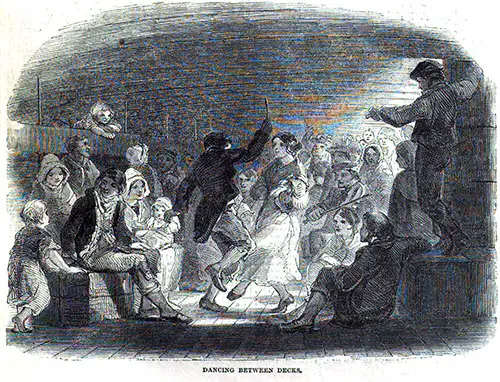
Steerage Passengers Dancing Between Decks. The Illustrated London News, 6 July 1850. | GGA Image ID # 14b6b9ef2f
The scenes that occur between decks on the day before the sailing of a packet and during the time that a ship may be unavoidably detained at the dock are not generally of a character to impress the spectator with the idea of any significant or overwhelming grief on the part of the emigrants at leaving the old country.
On the contrary, all is bustle, excitement, and merriment. The scene represented by our Artist, of a party of male and female emigrants dancing between decks to the music of the violin played for their amusement by some of their fellow passengers, is not a rare one.
Sometimes, a passenger is an Irish bagpipe musician. He is often called upon to play music for the gratification of his countrymen and women. Not merely while at the dock but, according to the reports of captains and others, during the voyage.
The key person who can play the violin, the flute, the pipe, or any other instrument becomes essential to the passengers and is kept in constant requisition for their amusement. The youngest child and the oldest man on the ship are alike.
The grey-headed men and women are frequently seen dancing with great delight and vigor as if they were seventeen and not seventy years old.
But, as the hour of departure draws nigh, the music ceases. Too many fresh arrivals occur every moment, and the decks become burdened with luggage to admit the amusement.
Although the day and hour of departure may have been given weeks in advance, there is a large class of persons—not confined to emigrants, who never will be punctual.
They seem to make a point of postponing everything to the last moment to enjoy the excitement of being within a few minutes or even moments of losing their passage.
These may be seen arriving in flushed and panting detachments, driving donkey carts laden with worldly stores to the gangway at the ship's side. Often, the gangway has been removed before the late arrivals. In this case, their only chance is to wait until the boat reaches the dock gate.
At this point, their boxes, bales, barrels, and bundles are actually pitched into the ship. Then men, women, and children have to scramble up among the rigging amid screaming, swearing, and shouting that is utterly alarming to listen to.
A box or a barrel frequently falls overboard; sometimes, a man or woman shares the same fate. Fortunately, they are speedily re-saved by men in a small boat that follows in the wake of this ship for that purpose until she has finally cleared the dock.
The Departure
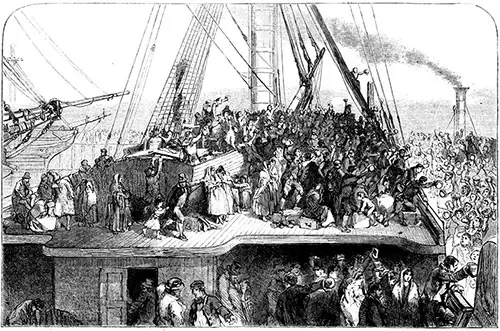
Departure of the Emigrant Ship from Liverpool. The Illustrated London News, 6 July 1850. | GGA Image ID # 14b6f94fe9
There are usually a large number of spectators at the dock gates to witness the final departure of the great ship with its large human cargo. It is an exciting and impressive sight.
At such a moment, the most callous and indifferent can scarcely fail to form cordial wishes for the pleasant voyage and safe arrival of the emigrants and their future prosperity in their new home."
As the ship is towed out, hats are raised, handkerchiefs are waved, and a loud and long-continued shout of farewell is raised from the shore, and the ship kindly responds.
It is then that the eyes of the emigrants begin to moisten with regret at the thought they are looking for the last time at the old country—that country which, although, in all probability, associated principally.
It is the country of their fathers, their childhood, and the country consecrated to their hearts, with the remembrance of sorrow, suffering, semi-starvation, and a constant battle for the merest crust necessary to support existence.
The last look is always sorrowful and refuses, in most instances, to see the wrong, suffering, terror, and misery which may have compelled the one who takes it.
To venture from the old into the new, from the tried into the untried path. To recommence existence under new auspices. And with new and different prospects.
"Farewell, England! ' Blessings on thee—
Stern and niggard as thou art.
Harshly, Mother, thou hast used me,
And my bread thou hast refused me:
But the agony to part is doubtless the uppermost feeling in the minds of many thousands of the poorer class of English emigrants.
The cheers of the spectators and friends on shore proclaim their departure from the land of their birth. Even in the case of the Irish emigrants, a similar feeling—though possibly less intense can scarcely fail to be 'excited.'
Limited time, however, is left to them to indulge in these reflections. The ship is generally towed by a steam tug five or ten miles down the Mersey.
During the time spent traversing these ten miles, two essential ceremonies must be undertaken. The first is "the Search for Stowaways," and the second is the "Roll-call of the Passengers."
The Search for Stowaways
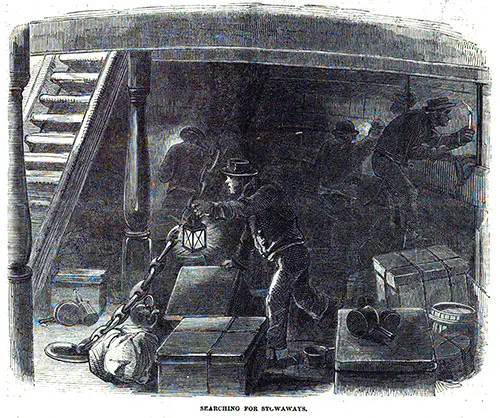
The Ship's Crew Search for Stowaways. The Illustrated London News, 6 July 1850. | GGA Image ID # 14b6f0a3a7
The practice of "stowing away" until after the passage tickets have been collected is stated to be very common to ships leaving London and Liverpool for the United States. It is the intent to procure a free passage across the Atlantic by fraud.
The "stowaways" are sometimes brought onboard concealed in trunks or chests, with air holes to prevent suffocation.
Sometimes, they are brought in barrels, packed up to their chins in salt, biscuits, or other provisions, to the imminent hazard of their lives.
At other times, they take the chance of hiding about the ship, under the bedding, amid the confused luggage of the other passengers, and in all sorts of dark nooks and corners between decks.
Hence, it is becoming expedient to thoroughly search the vessel before the steam tug has left her. If any of these unhappy intruders are discovered, they may be taken back to port and brought before the magistrate to be punished for the fraud they have attempted.
As many as a dozen stowaways have sometimes been discovered in one ship. Cases have occurred infrequently of dead men, women, and young boys being taken out of the barrels or chests that they concealed themselves in to avoid payment of £3 or £1 passage money.
When the ship is reasonably out, a search for stowaways is ordered. Steerage passengers are summoned upon the quarter deck and detained until the search has been completed in every part of the ship.
The captain, the mate, or other officers, attended by the clerk of the passenger broker and as many men of the vessel as may be necessary for the purpose, proceed below.
With masked lanterns or candles and armed with long poles, hammers, chisels, etc., they rummage, poke into dark places, and may break open suspicious-looking chests and barrels.
Occasionally, the pole is said to be tipped with a sharp nail to aid discovery in dark nooks. Sometimes, the man armed with the hammer strikes the bedclothes.
This method is used to reveal a concealed head underneath. Its owner may make the fact known and thus avoid a repetition of the blows. Stowaways hidden in barrels are presumed to have been placed with his head uppermost.
When searchers find a suspicious barrel, they deliberately turn the barrel's bottom upwards. This process never fails. After a short time, if the suspicion proves well-founded, it elicits an unmistakable cry for release.
Although this search is invariably done with the utmost care, it is not always adequate in discovering the delinquent. Instances have occurred in which eight, ten, or more stowaways, both men and women, have appeared after the vessel has been two or three days at sea.
Some captains acted severely, if not cruelly, toward these unfortunates. Stowaways were tarred and feathered or made to walk the decks through the cold nights with nothing on but their shirts.
But this inhumanity does not now appear to be practiced. As a great deal of dirty work must be done on shipboard, the stowaways are pressed into that service and compelled to make themselves useful, if not agreeable.
They are forced to work their passage out, and the most unpleasant jobs are imposed upon them. The next ceremony, Rollcall, is commenced after a diligent search for stowaways in every corner of the ship.
Roll Call
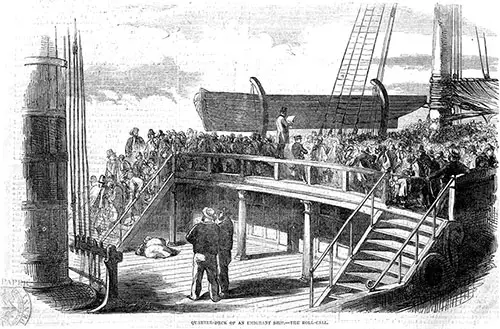
Steerage Passengers Summoned to the Quarter-Deck of the Emigrant Ship for Roll Call. The Illustrated London News, 6 July 1850. | GGA Image ID # 14b6f47c6f
This occupies a considerable amount of time, especially on a large ship containing seven or eight hundred emigrants. Once the steerage passengers are assembled upon the quarter deck, the clerk of the passenger broker, accompanied by the ship's surgeon and aided by the crew (to preserve order), proceeds to call for the passage tickets.
The clerk, or another man in authority, usually stands upon the rail or other convenient elevation on the quarter deck to see over the heads of the whole assemblage.
Steerage passengers are usually very motley, comprising people ages seven weeks to seventy years.
The roll call's dual purpose is to verify the passenger list and medically inspect the emigrants on behalf of the captain and owners.
The governor's previous inspection was to prevent the risk of contagious disease on board. The owners' review is for a different object.
The ship must pay the State of New York a poll tax of one dollar and a half per passenger. If any of the unfortunate emigrants are discovered to be helpless and deformed, the owners are fined seventy-five dollars.
They are also compelled to enter into a bond with the city of New York, guaranteeing that they will not become a burden on the public.
To prevent this risk, the ship's medical officer passes them under inspection. The captain may refuse to take a pauper cripple unless he has friends in America to take charge of him on arrival and provide for him afterward.
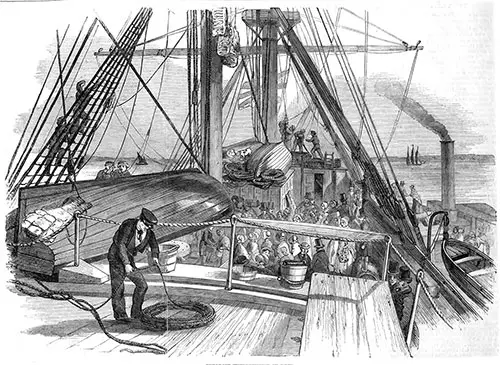
Emigrants Crowded Onto the Steerage Deck on an Emigrant Ship. The Illustrated London News, 17 August 1850. | GGA Image ID # 14b736055c
The verification and inspection process generally takes two to four hours, depending on the number of emigrants on board, and noteworthy incidents occasionally arise during its progress.
Sometimes, an Irishman with a wife and eight or ten children attempts to evade the payment of any passage balance due by pleading that he has nothing left in the world. He trusts that the ship will instead take him out to New York for the sum already paid rather than incur the trouble of putting him onshore again with his family.
Sometimes, a woman may have included an infant at the breast in her passage ticket. And when her name is called, she is panting under the weight of a strapping boy of eight or nine years of age, whom she is holding to her bosom as if he were a suckling.
Sometimes, a nineteen-year-old has been listed in the passage contract as being under the age of twelve to get to America for half fare. Sometimes, a whole family is without any tickets, having come on board in the hope that amid the confusion, they may manage to evade notice. They hope to slip down unperceived—among those whose documents are found en règle.
These cases, as they occur, are placed on one side, and those who have duly paid their passage money and produced their tickets are allowed to pass down and take possession of their berths.
Steerage passengers who have not paid in full and cannot pay the balance due are then transferred to the tug, including bag and baggage, to be reconvened to port.
Those who have money produce the necessary funds, which, in the shape of golden sovereigns, are not infrequently found to be safely stitched amid the rags of petticoats, coats, and unmentionable garments.
Those who have no money and cannot manage to appeal to the crowd's sympathy for help must resign themselves to their fate. They will remain in the poverty from which they seek to free themselves until they can raise the small sum necessary for their emancipation.
The stowaways, if any, are ordered to be taken before the magistrates. After all strangers and interlopers have been safely placed in the tug, the emigrant ship is left to herself! May all prosperity attend her living freight!
" Far away—oh, far away—
We seek a world o'er the ocean spray!
We seek a land across the sea,
Where bread is plenty, and men are free.
The sails are set, the breezes swell—
England, our country, farewell! farewell!"
"Emigration from Liverpool," in The Illustrated London News, Vol. XVII, No, 434, Saturday, 6 July 1850, pp. 19-22.
Emigration from Liverpool (1850) Summary
A Vital Resource for Immigration Historians and Genealogists
For teachers, students, genealogists, family historians, and immigration researchers, this detailed account of emigration from Liverpool in 1850 offers an unparalleled glimpse into the journey of millions of emigrants leaving Europe for North America. Liverpool was the largest departure port for Irish, English, and European emigrants, making this article an essential historical resource for those tracing family migration routes or studying 19th-century immigration policies, travel conditions, and passenger experiences.
Why This Article is a Must-Read for Immigration Studies
- Key Insights into 19th-Century Emigration – This article documents the step-by-step process of emigration from purchasing passage contracts to final departure, providing rich details about the challenges, procedures, and regulations that emigrants faced.
- Passenger Brokers & "Man-Catchers" – Learn about the business of emigration, including licensed brokers, fraudulent practices, and agents who aggressively recruited passengers for specific shipping lines.
- Medical Inspections & Emigration Laws – A critical aspect of immigration history, the article explains how passengers were medically examined before departure to prevent the spread of disease and ensure only "fit" emigrants were allowed to travel.
- Life in Steerage – The article describes the living conditions aboard emigrant ships, from the food rations provided to the cramped accommodations and even social activities like dancing between decks.
- Departure & Emotional Farewells – The vivid descriptions of the farewell scenes at Liverpool’s docks, the final roll-call, and the emotional toll of leaving one’s homeland are invaluable for understanding the human side of immigration history.
- Stowaways & Immigration Fraud – A fascinating section reveals how some desperate individuals attempted to sneak aboard ships in barrels or disguised as children to escape poverty and gain free passage to America.
Who Should Read This Article?
- Genealogists & Family Historians – If your ancestors emigrated from Liverpool to North America in the mid-19th century, this article provides firsthand details about their journey, the ticketing process, and travel conditions.
- Historians & Immigration Researchers – A primary source on transatlantic migration, offering insight into government regulations, medical screenings, and shipboard life for emigrants.
- Educators & Students – A compelling classroom resource for studying 19th-century migration, economic factors driving emigration, and the role of Liverpool as a gateway to the New World.
Discover the Untold Stories of 19th-Century Emigrants
This article offers a rare, detailed account of what it was like to emigrate from Liverpool in 1850. Whether you are researching family history, immigration laws, or the human struggles of transatlantic migration, this richly detailed historical record is a must-read.
